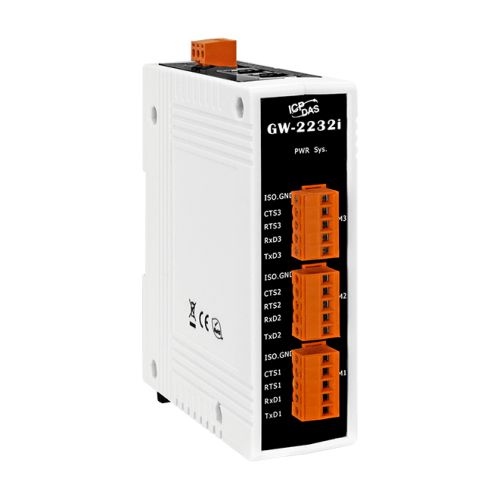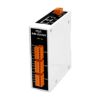GW-2232i CR
Modbus/TCP to RTU/ASCII Gateway with 2-port Ethernet Switch and 3 Isolated RS-232 Port
Free Shipping
Features
- Supports Modbus TCP/UDP master and slave
- Supports Modbus RTU/ASCII master and slave
- Max. TCP connections (masters) per serial port: 32
- Read-cache ensures faster Modbus TCP/UDP response
- Supports UDP responder for device discovery (UDP Search)
- Static IP or DHCP network configuration
- Built-in Web Server (HTTP)
Introduction
Modbus has become a de facto standard industrial communication protocol, and is now the most commonly available means of connecting industrial electronic devices. For example, a system that measures temperature and humidity and communicates the results to a computer. Modbus is often used to connect a supervisory computer with a remote terminal unit (RTU) in supervisory control and data acquisition (SCADA) systems.
The GW-2200 is a Modbus TCP to RTU/ASCII gateway that enables a Modbus/TCP host to communicate with serial Modbus RTU/ASCII devices through an Ethernet network, and eliminates the cable length limitation of legacy serial communication devices. The module can be used to create a pair-connection application (as well as serial-bridge or serial-tunnel application), and can then route data over TCP/IP between two serial Modbus RTU/ASCII devices, which is useful when connecting mainframe computers, servers or other serial devices that use Modbus RTU/ASCII protocols and do not themselves have Ethernet capability.
The read-cache function is used to store previous requests and responses in the memory buffer of the GW-2200 module. When other HMI/SCADA master controllers send the same requests to the same RTU slave device, the cached response is returned immediately. This feature dramatically reduces the loading on the serial port communication, ensures faster TCP responses, and improves the stability of the entire system.
The GW-2200 module features a powerful 32-bit MCU to enable efficient handling of network traffic, and also has a built-in web server that provides an intuitive web management interface that allows users to modify the configuration of the module, including the DHCP/Static IP, the gateway/mask settings and the serial port settings.
The module contains a dual watchdog, including a CPU watchdog (for hardware functions) and a host watchdog (for software functions). The CPU watchdog automatically resets the CPU if the built-in firmware is operating abnormally, while the host watchdog automatically resets the CPU if there is no communication between the module and the host (PC or PLC) for a predefined period of time (system timeout). The dual watchdog is an important feature that ensures the module operates continuously, even in harsh environments. In addition, the GW-2200 series (for i version) also adds 3000 VDC isolation and +/-4 kV ESD protection component that diverts the potentially damaging charge away from sensitive circuit to protects the module and equipment from the sudden and momentary electric current.
With 2 Ethernet ports, the GW-2200 allows daisy chain connection which permits the flexibility in locating devices, eases installation and lowers infrastructure costs. The GW-2200 module offers true IEEE 802.3af-compliant (classification, Class 1) Power over Ethernet (PoE) functionality using a standard category 5 Ethernet cable to receive power from a PoE switch such as the NS-205PSE. If there is no PoE switch on site, the module will also accept power input from a DC Terminal Block.
Specifications
CPU Module
CPU: 32-bit ARM
COM Ports
Ports: 3 x 5-wire RS-232 (1000 VDC for Power Isolation, 3000 VDC for Signal Isolation)
Baud Rate: 115200 bps Max.
Parity: None, Odd, Even, Mark, Space
Data Bit: 5, 6, 7, 8
Stop Bit: 1,2
Ethernet
Ports: 10/100 Base-TX, 8-pin RJ-45 x 2, (Auto-negotiating, Auto-MDI/MDIX, LED indicator)
PoE (IEEE 802.3af, Class 1)
Power
Consumption: 0.07 A @ 24 VDC
Powered from PoE: IEEE 802.3af, Class 1
Powered from Terminal Block: +12 ~ 48 VDC
Mechanical
Casing: Plastic
Dimensions (mm): 97 mm x 33 mm x 126 mm (W x L x H)
Installation: DIN-Rail Mounting
Environment
Operating Temperature: -25 ~ +75 °C
Storage Temperature: -30 ~ +80 °C
Humidity: 10 ~ 90% RH, non-condensing







